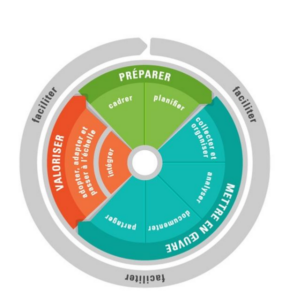On Tuesday, 28 March 2023, YenKasa Africa regional initiative, in partnership with the Food and Agriculture Organization of the United Nations (FAO) and the International Fund for Agricultural Development (IFAD), held the first session of a series of webinars aimed at strengthening the capacity of organizations in knowledge management. The webinar series in French reviews the online course on “Experience capitalization for continuous learning”. This course is available free of charge on FAO Digital Academy.
Experience capitalization is a systematic, iterative, and participatory process of analysing and documenting experiences, leading to knowledge that can be shared and used to generate change. This methodology is crucial for organizations to learn from past experiences and improve future performance. Experience capitalization can be applied to different sectors of activity in different contexts, including agriculture, fisheries, forestry, health, education and many others.
Although experience capitalization has similarities with other disciplines such as monitoring and evaluation (M&E), communication and project management, it is a distinct process with specific characteristics. Experience capitalization focuses on learning from experiences, while M&E evaluates the results of projects or programmes and measures progress towards specific objectives.
Sophie Treinen, Communication for Development Officer at FAO, and Alice Van der Elstraeten, Knowledge Management and Communication Expert at IFAD, facilitated this first webinar. More than 500 people from different organizations and projects had registered, showing great interest in learning about learning from experience and applying it in their work.
This first of six webinars presents the units of the online course. It does not replace the online course, but highlights the key points so that participants can go further in their learning. In future webinars, participants will have the opportunity to discover practical tools to help them capitalize.
The introductory webinar shed light on the importance of individuals and organizations taking time to reflect on their past experiences in order to improve their future performance. It highlighted the importance of involving all stakeholders in the capitalization process to ensure that the multitude of perspectives and therefore different experiences are taken into account.

The capitalization process has three main phases: preparation, implementation and generating change. Each phase is divided into steps. The whole Capitalization cycle allows experiences to be critically analysed, lessons to be learned from failures and successes, documented and shared so that they generate change and are adopted.
Facilitation is at the heart of the process and has a role to play in each step of the cycle. The online course is available in English, French, Spanish and Russian. It consists of five units, each requiring between one and three hours of work.
This introduction to capitalization gave the participants a better idea of what they could do with capitalization. They were able to ask their questions in the second part of the introductory session. Exchanges are continuing on the community of practice on the YenKasa Africa Dgroups – Capitalization of experiences.
This first session was a great success. Please feel free to watch the webinar if you were not able to attend live. You can watch the full webinar on the YenKasa Africa Facebook page or watch a shorter version on our YouTube channel.
Register now for future webinars by clicking HERE.
If you would like to access the presentation, we invite you to join the community of practice on YenKasa’s Dgroups.

